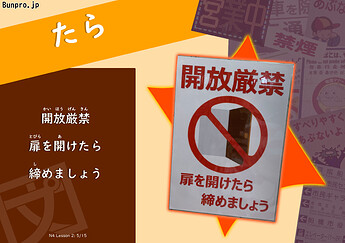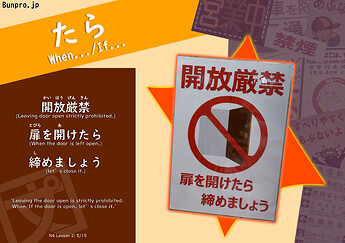July 8th:
たら
I should probably join in on embarrassing myself
guess
[Leaving the] door open strictly prohibited
If the door is open let’s close it
For my points of confusion, is this more about leaving the door open and not so much “do not open the door at all”?
~ましょう always gives me the feeling of cooperation which is why I kept the wording that way despite my usual instincts wanting something along the lines of “If you open the door please close it.” When I glanced at the point I realized it was described as [polite volitional], would it have been fair to stick with “please close the door” here?
How does this site manage to make me feel so inadequate about basic signs?
Thanks for the information on the subjects! Can’t begin to say how fun these have been so far.
Translation
Leaving the door open is prohibited. If you open the door then let’s remember to close it. Had no idea what 扉 meant before I did my translation, I should have seen the door kanji already in there but I’m still happy with my attempt!
Translation
Leaving the door open is strictly prohibited.Once you open it, close it behind you!
Summary
Were you born in a barn?
Leaving the door open is prohibited. If the door is open, let’s/please close it.
Thank again for the detailed explanation. The absence of subject is really a pain in the neck. But it also sometimes leads to funny misunderstading. 
As for today:
Translation
Leaving open strictly prohibited
If door is open please close it
And after reading other translations i realized i probably should have used transitive…
Use case
日本での仕事を見つけたら絶対日本に引っ越しします。
Here is our translation:
Note: Even though we put ‘close’ here, it might be handy to know that this kanji (締) usually means ‘to fasten’. It has the nuance of ‘closing’ in this instance, but it could also easily be translated as ‘secure’ (so it doesn’t swing open in the wind and smack someone in the face!)
Translation
In other words, this is my revenge.
こいつ
I hope こいつ plays a role of fancy これ、otherwise I don’t understand who’s こいつ and how they can be 復讐 
Question
Can it be translated as “this guy is my revenge” if someone who’s オレ summoned some creature (こいつ) in order to make 復讐?
translation
So basically this thing (person?) is オレ’s revenge. Had to look up 復讐, is there any difference between that and 報復? Either way, I assume オレ is someone’s name and the person talking is referencing something that’s challenging him to a fight of some sort. okay LOL after seeing the above translation i feel stupid for somehow not seeing オレ as 俺  i don’t think i’ve seen it written it katakana before so that threw me off severely.
i don’t think i’ve seen it written it katakana before so that threw me off severely.
explanation
You were on the right track but just the opposite! After I did my translation attempt I looked up こいつ to double check and this is the explanation from tofugu:
こいつ, そいつ AND あいつ
Some Japanese third-person pronouns are actually “demonstratives” — words that help to point something or someone out, kind of like “this” and “that” in English. Japanese demonstratives are easy to recognize since they all start with こ〜, そ〜, or あ〜.
こいつ, そいつ and あいつ are demonstratives that we use specifically for people. こいつ means “this person,” そいつ means “that person” and あいつ means “that person over there.”
Keep in mind that they’re very casual words, with a similar vibe to “this guy” or “this dude” in English, though they don’t indicate gender. They can be used to express a dislike for the person you’re referring to, but they can also express affection — as if you’re picking on the person in a lighthearted way.
To go a little further, the second half of this post from the TK blog covers variations of やつ as applied to a situation as well.
http://www.guidetojapanese.org/blog/2006/06/24/やつ/
putting it all together in a bad way
Basically, this shit’s my revenge.
I’m sorry, between the computer example in the TK blog and the smug looking cover art I had to do it.
random thought about つまり
I saw the example here listed “in other words” and immediately thought of this song. Here’s a different version for people of culture.
Thanks for this! Really insightful, I’ve never really poked around TK’s blog before but now I’m curious to see what else he’s explained there that wasn’t really covered in his grammar guide before.
If こいつ here means “this person”, it kinda confuses me. (I added a question to my previous post trying to understand can it be possibly a living creature.)
But Jisho says it can be “this; this one; this thing” too, so I’m not sure how to interpret it.
I took the 締めましょう as more of a passive-aggressive volitional rather than a polite volitional; from ‘let’s close it’ but it’s really ‘shut the door’ IMO
Summary
In the end, I will get my revenge on the bastard (Lit: In other words, he is my revenge)
Translation
In other words this is my revenge
Use case
辞書によると「こいつ」のいみは「それ」か「その人」です。つまりHotAirGunさんのように、その言葉の翻訳に迷っています。
July 9th Translation
Notes: When trying to figure out what こいつ means, it might be helpful to look at the verb being used (or the speakers emotional state in general). While it is always difficult to figure out the meaning without extra context (like a picture), it could be assumed in a sentence like this that こいつ would probably be a person. Because 復讐 (a very strong word for revenge) is used, it would usually be safe to assume that こいつ would be a person. This would be because the speaker would probably not refer to something that they are strongly emotionally disturbed about as こいつ if it were inanimate. This doesn’t work 100% of the time, but it should help for the majority!
I feel こいつ has a derogatory tone here but we have some missing context to piece this together, but sounds like my literal translation was correct (which sounds very stiff)
Summary
What? That’s right, that’s the extent/capacity of the MO (disk/drive)
力の限り頑張ろう!
Translation
Um? That’s right, that MO is all we have.





